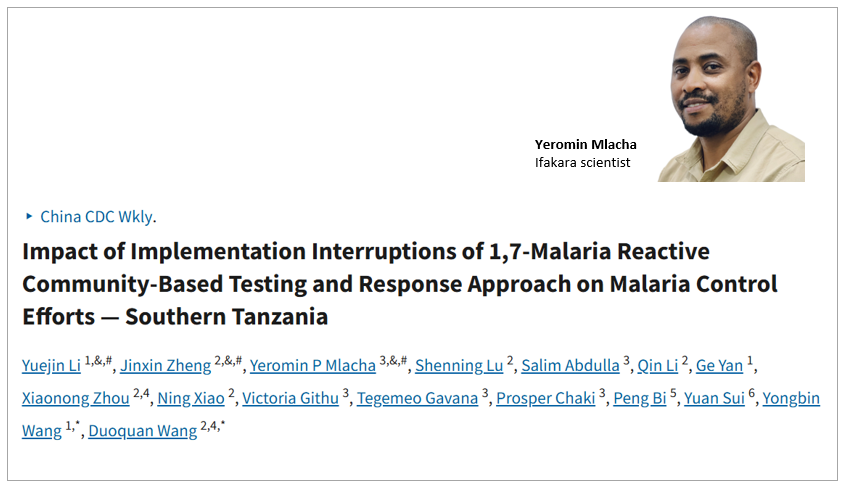
MALARIA: Disruptions undermine control efforts in southern Tanzania

A new study by the Ifakara Health Institute and its partners evaluating a major malaria intervention in Tanzania highlights how various disruptions—such as security challenges, disease outbreaks, and supply chain shortages—can significantly hinder progress in the fight against malaria.
Published on China CDC Weekly, the study is based on data from the China-Tanzania Malaria Control Project and focuses on a promising strategy known as the 1,7-mRCTR, short for 1,7-malaria Reactive Community-Based Testing and Response. It examines how unforeseen interruptions have impacted the effectiveness of this approach implemented in Pwani and Lindi regions in southern Tanzania between 2016 and 2021.
What is the 1,7-mRCTR approach?
The 1,7-mRCTR approach involves identifying and responding to malaria cases within a community over a seven-day period. Previous findings have shown it to be effective in lowering malaria incidence rates. However, this new study highlights that the approach’s success depends heavily on two key factors: consistency and adaptability.
"This research demonstrates that Tanzania’s malaria incidence is closely linked to seasonal patterns and consistent intervention efforts," the authors noted in their paper published on the China CDC Weekly. They emphasized the importance of "adaptive strategies" to maintain progress in malaria control goals.
How disruptions impact effectiveness
The research team, comprising scientists from China, Tanzania, Australia, and the USA, analyzed weekly malaria case data from two phases of the China-Tanzania Malaria Control project - Phase I (2016–2018) and Phase II (2019–2021). Using advanced statistical models, they uncovered the impact of disruptions on implementation performance.
During Phase I, security issues in the Rufiji intervention area led to an eight-month interruption (January–August 2017), which reduced the intervention’s effectiveness. Meanwhile, in Phase II, the outbreak of other infectious diseases caused another pause (March–May 2020), although this was shorter and had less severe consequences.
"The eight-month interruption during Phase I reduced the effectiveness of the 1,7-mRCTR implementation by 12.5%," the authors explained. "In contrast, the three-month passive interruption during Phase II caused only minor transient fluctuations with minimal impact on the overall effectiveness of the 1,7-mRCTR approach. Additionally, temporary shortages of RDT reagents had negligible effects on implementation effectiveness."
Timing and adaptability are crucial
The study also underscored the role of seasonal patterns, with malaria cases typically peaking in November–December and June–July. The combination of these seasonal surges and inconsistent intervention made it clear that "timing and adaptability" are essential in maintaining malaria control momentum.
Building resilient malaria programs
As Tanzania and other malaria-endemic countries push toward elimination, this study offers valuable insight: future malaria control strategies must be designed to withstand and recover quickly from disruptions. Whether caused by conflict, pandemics, or logistical setbacks, programs need built-in resilience.
A key recommendation from the researchers is to ensure that health facilities in high-transmission areas pre-stock essential supplies such as rapid diagnostic tests (RDTs) and treatments. This preparedness can help maintain screening and treatment activities during emergencies.
Ifakara scientists contribute to the study
Several scientists from the Ifakara Health Institute contributed to this research. Yeromin Mlacha served as lead co-author alongside Yuejin Li from the Shandong Institute of Parasitic Diseases and Jinxin Zheng from the Chinese Center for Disease Control and Prevention.
Other contributors from Ifakara include Salim Abdulla, Victoria Githu, Tegemeo Gavana, and Prosper Chaki. Additional authors came from Shanghai Jiao Tong University, the University of Adelaide (Australia), and the Statistical Center for HIV/AIDS Research and Prevention (SCHARP) at the Fred Hutchinson Cancer Center (USA).
Read the publication here.
